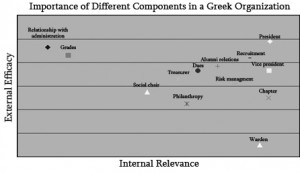 Every week in our executive meeting, my chapter discusses ways to improve the fraternity.
Every week in our executive meeting, my chapter discusses ways to improve the fraternity.
We mention philanthropy, although those conversations don’t usually move anywhere.
Sometimes we grow frustrated with members who we think are not doing their job adequately.
But what if we’re placing emphasis in the wrong places?
What if there are other problems that are more important than philanthropy that should be dealt with?
How do we sift through and deduce what is important and what isn’t?
What actually moves the boulder?
This summer, I began to think of a precise model for evaluating the importance of different components within a Greek organization.
Initially, I struggled to figure out on what basis we can judge what’s effective.
There are two areas of judgment when evaluating your organization: external efficacy (how something may affect the outward perception of the organization) and internal relevance (how much something really matters to members).
From this, I was able to effectively evaluate the importance of every component in an organization.
So here we go. I won’t explain every component, but hit on most.
Nothing is more important than the president.
The president not only is responsible for communicating with external parties, like the administration or nationals, but also for crafting the organization’s image.
Being the heart and soul of the organization, they must evaluate the components of their organization and figure out how to move them to their proper positions.
Are we stressing recruitment enough?
Is the treasurer effectively doing his job?
Addressing these big picture questions is the niche of the president.
While the president handles exterior problems, the vice president facilitates the internal dynamic among the members.
Because of this, internally the vice president is just as important as the president.
They shape the dynamic and morale of the brothers and determine the itinerary for executive meetings.
They must feel the pulse of the organizations’ members.
But while the vice president is important internally, they don’t affect the outward perception as much.
Externally, their importance is not as vital as other facets of the organization.
For example, a fraternity’s relationship with the administration may be the most externally important component of the organization.
Being on the same page as the Greek life advisors, the various deans and anyone else with a hand in running Greek life is immensely conducive to success on campus.
The importance of enhancing communication with the administration is immeasurable.
Yet inwardly, some brothers may not have any idea who actually makes up the administration that affects Greek life.
Internally, the administration’s importance to brothers is minimal.
Externally, having a working and successful relationship with them is paramount.
Grades also in a similar manner fit these criteria.
Inwardly, grades do not majorly affect the internal dynamic of the organization.
Grades do not affect friendships, nor do they really drive down morale.
Yet externally the effectiveness of grades in molding a positive perception cannot be emphasized enough.
This is why the administration hands us an academic report regarding every Greek organization annually and why nationals place so much emphasis on grades.
Another element of supreme importance both internally and externally is recruitment.
The importance of successful recruitment cannot be stressed enough.
Recruitment equals sustainability.
It is imperative for a successful organization.
Internally, you must recycle brothers once they graduate.
This is done through the recruitment process.
If is not done adequately, there won’t be enough brothers for any type of internal presence.
For external purposes, these recruits need to be shaped.
Finding batches of new members who are effective towards cultivating a positive outward image is vital.
If an organization can find leaders and craft them into externally effective members, then they have found the ultimate recipe for success.
The more recruits you have, the better your organization will look.
The more competent these recruits are in understanding the ideals of your organization and the intricacies of making it run smoothly, the greater assets they will be in molding administrative relationships.
My model is a recipe for strengthening your organization.
The key is remembering to take a step back and think, “does this really matter?”
Because in some cases, it may not matter at all.
Categories:
The Boulder #4: building a better Greek organization
October 28, 2010
Story continues below advertisement
0
More to Discover




